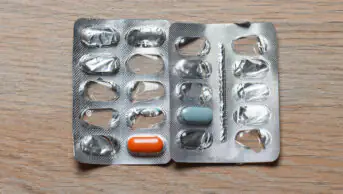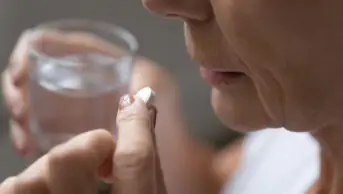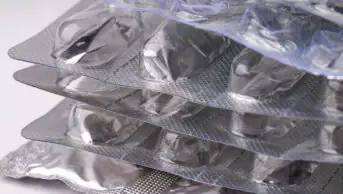
Shutterstock.com
Guidance from the Specialist Pharmacy Service has advised clinicians to encourage children “to swallow oral solid dose forms” of antibiotics where possible, instead of using oral suspensions.
The guidance was published on 7 December 2022 following reports from pharmacists of worsening supply problems for antibiotic oral suspensions for children, including penicillin, amoxicillin and azithromycin.
“Whole doses of solid oral dosage forms can be used ‘off-label’ in place of oral suspensions. This includes use for group A streptococcal infections,” the guidance says, advising on dispersing eight types of antibiotic.
“Where children are unable to swallow oral solid dose forms, we have provided advice on how to give doses by dispersing or crushing tablets, or opening capsules. Use in this way is outside the product licence (‘off-label’).”
Speaking to The Pharmaceutical Journal on 7 December 2022, Leyla Hannbeck, chief executive of the Association of Independent Multiple Pharmacies, said antibiotic prescribing had “doubled in November 2022” and continues to rise, owing to concerns around an increase in Strep A infections in children across the UK.
As a result, Hannbeck said pharmacies have reported difficulties in obtaining stock of penicillin, amoxicillin and azithromycin.
She added that assertions made by health secretary Steve Barclay in media interviews on 7 December 2022that the government is “not aware of any shortages” is “misleading”.
“I’m getting text messages from pharmacists saying that they have patients who have travelled to 12 pharmacies to get [antibiotics] and they’ve had patients who have had to travel 20 miles to get some,” she said.
“We also know that the prescription levels for penicillin and antibiotics have doubled in November [2022], so the [Department of Health and Social Care] should have had that data to see that prescription levels are going up for antibiotics and put plans in place to ensure better supply,” she added.
“They go around saying that there is supply but when pharmacists go to order they get a message from suppliers — and we’re talking all suppliers, not just one or two. The message they’re getting is that there is no stock available.”
Screenshots of medicine ordering systems seen by The Pharmaceutical Journal show out of stock symbols against nine penicillin products, four azithromycin products, six clarithromycin products and seven amoxicillin products.
Ashley Cohen, managing director of independent pharmay chain, Pharm-Assist, said: “The situation we see is completely different to what has been announced by Steve Barclay. Stock is not available.
“I am having to spend hours each day trying to source stock which I should be able to auto order via a computer. Pharmacy shelves have no stock, wholesalers have no supply, and if it’s in the country it will take days to mobilise, not just into local wholesaler depots and then pharmacies, but to patients. Those who are sick and ill today will get worse.
“[Pharmacists] are seeing wholesalers significantly increase prices so if we can get stock we have no idea what we are paying for it, and I have heard from some colleagues that they are losing close to £20 per prescription for Pen V liquid — this is completely unsustainable.”
Jasmine Shah, head of advice and support services at the National Pharmacy Association, said: “There has been a spike in demand for some antibiotics, including those used to treat Strep A infection in children. Our members are having to work very hard to obtain stocks of these antibiotics and some lines are currently unavailable.
“We have been advised by wholesalers that most lines will be replenished soon, but we cannot say exactly when that will be.”
Martin Sawer, executive director at the Healthcare Distribution Association told The Pharmaceutical Journal: “Pharmaceutical wholesalers are working hard with their manufacturer partners to increase supply to meet this unprecedented demand. There will be enough stock in the supply chain, but Government, manufacturers and wholesalers are working hard to ensure it gets to the areas seeing the highest demand as quickly possible.”
A spokesperson for the DHSC said: “There is no supplier shortage of antibiotics available to treat Strep A. As the secretary of state said this morning, we sometimes have surges for products and increased demand means some pharmacies are having difficulties obtaining certain antibiotics.
“We are working urgently with manufactures and wholesalers to explore what can be done to expedite deliveries and bring forward stock they have to help ensure it gets to where it’s needed, to meet demand as quickly as possible and support access to these vital medicines.”
- For related information, visit: Everything you need to know about group A streptococcus infections
- This article was updated on 8 December 2022 to amend the headline and include additional comment


